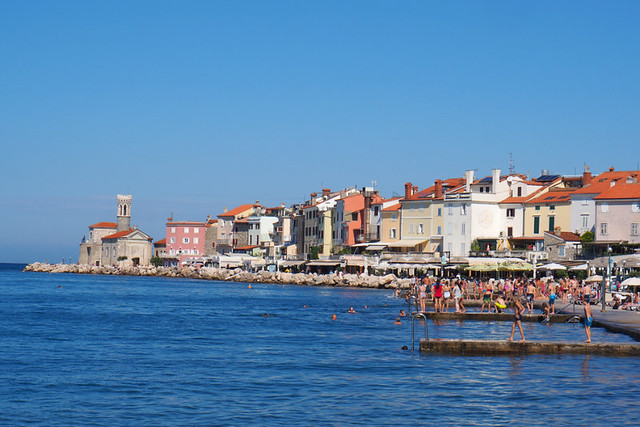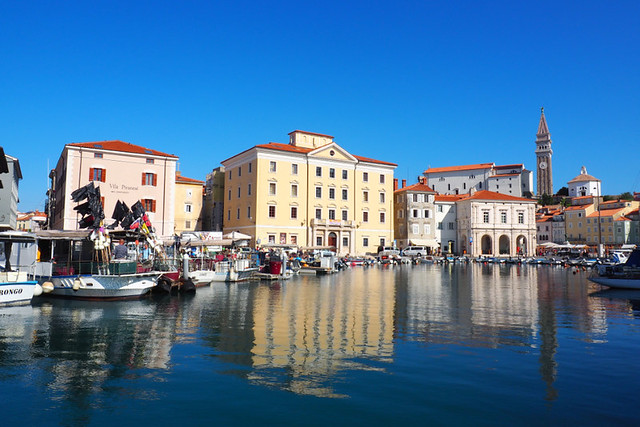Season six of Buffy the Vampire Slayer starts with Buffy’s friends raising her from the dead, believing she was in Hell. Turns out she was enjoying serenity in Heaven, so wasn’t best pleased with her buddies’ misguided intervention. At the start of 24 hours in Piran, I felt a bit like Buffy did when she was yanked out of her celestial paradise.
Where is Piran?
Hemmed in by Italy to the north and Croatia to the south, Slovenia has less than 47km of coastline. There are three main towns on this stretch of land overlooking the Adriatic, the pick of which is Piran, whose historic centre is squeezed into a lizard’s head-shaped peninsula.
A snatch of historic background
As first-time visitors to Piran, what immediately struck us was how it felt more Italian than the towns we’d passed through/stayed in during our travels around Slovenia. There’s a good reason for this. Initially under Byzantine rule, Piran was part of the Republic of Venice from the 13th century until 1797. After that it was part of the Austrian Empire, Napoleonic Empire, belonged to Trieste, and then was annexed to Yugoslavia. It’s been Slovenian since 1991, but it’s the Venetian period which has left the biggest impression.
So, what’s not to like about a town with picturesque Venetian architecture?
It’s time I put my opener into context. We’d just spent the previous couple of weeks travelling around Slovenia on foot, in a car, and by train. Apart from a stay in Ljubljana after we arrived in the country, all our bases were in rural accommodation in scenic, tranquil valleys. We were used to a countryside that was largely devoid of people, and Piran was rammed. It was full of bronzed people of all ages, lounging all along the concrete promenade which separates the pastel Venetian buildings from the sparkling Adriatic. Basically, finding ourselves in the midst of crowds of people after the serenity of the hinterland came as a culture shock. Had we arrived directly from Ljubljana it would have been a different story.
What’s Piran like?
It’s pretty, and compact, and a tad bewildering. The town’s sea-facing façade is undeniably pleasing on the eye – immaculate, slender townhouses with soft peach, pale lemon, and minty green colours stand shoulder to shoulder with grander edifices such as the Town Hall and the Venetian House. A row back, the scene is more shabby chic, the pastel façades weather weary but still attractive. Being sardined into a small peninsula means space is at a premium, resulting in a network of narrow alleys, some linked by arched tunnels. It’s small, but it’s also easy to lose your bearings once you venture away from the seafront.
What is there to do in Piran?
Piran is a place to kick back, following the lead of the visiting Italians who add volume to its bustling streets during the summer months. Early morning or late afternoon is best for a meandering stroll. There are no standout attractions, merely a few quite interesting ones.
The Punta Lighthouse is where the fires that gave the town its name (from the Greek pyr) were lit to guide ships into the port of Koper.
The Cathedral of St George has a belltower based on St Mark’s campanile in Venice. The weathervane atop it is used by locals for weather predictions. Pointing toward northern Italy is good, pointing toward Croatia isn’t.
A climb to the town’s old walls rewards with views across Piran to the Adriatic and Italy, and, if the weather is right, even as far as the Alps.
Tartini Square is Piran’s showpiece. Opening onto the pretty harbour, the marbled square is simply a nice place to hang out, drinking a beer at a pavement café, browsing the small artisan market, or picking up some souvenirs made with salt from Secovlje Salina Nature Park further along the coast.
Enjoy sunset. The show when the sun goes down is quite lovely. It might not be dramatic – no fiery streaks flashing across the sky – but the dreamy hues that turn sky and sea mauve (no filters used in the photo) compliment the colours of the Venetian buildings perfectly.
What and where to eat in Piran
Fish and shellfish are mostly the order of the day in the restaurants along the seafront, which come as a welcome change if you’ve spent several days with the hale, hearty, and meaty fare of the interior. Unsurprisingly, there’s a strong Italian influence in the cuisine, again no bad thing; although, a pizza we had during lunch at Pizzeria Batana overlooking the harbour was only so-so.
We wanted to try the characterful, hole-in-the-wall Fritolin pri Cantini where a plate of sardines came in at under €7 (great value in Piran, where prices were higher than other areas), but we had no chance. On a summer night, getting in anywhere wasn’t easy. Thankfully our hotel, Hotel Piran, served food as elegant as the surrounding architecture. An added attraction was its terrace beside the sea occupies the best spot in town. At around €20 for a not-very-big main course, it was pricey though.
Overall opinion
Once I got over the culture shock, I was able to appreciate Piran’s charms more. It is a pretty little town that feels more Italian than Slovenian, which makes for an interesting contrast to other parts of the country. As a place to end a trip which took us from the east to the west and from north to south, it was an aesthetically pleasing location to wind down before heading home. But I don’t think I’d want to spend more than a couple of days there. Maybe that’s just because I found other parts of Slovenia more interesting.
Interesting Piran snippet
In 2010, the people of Piran elected Peter Bossman as their mayor. The Ghana-born doctor was the first black mayor to be elected in an eastern European country.










Be the first to comment